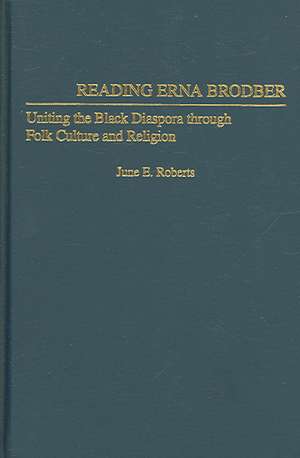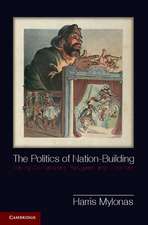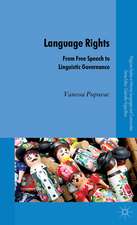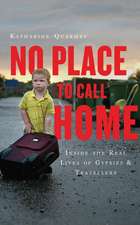Reading Erna Brodber: Uniting the Black Diaspora through Folk Culture and Religion: Contributions in Afro-American and African Studies: Contemporary Black Poets
Autor June E. Robertsen Limba Engleză Hardback – 29 mar 2006 – vârsta până la 17 ani
Din seria Contributions in Afro-American and African Studies: Contemporary Black Poets
- 28%
 Preț: 458.81 lei
Preț: 458.81 lei - 27%
 Preț: 363.98 lei
Preț: 363.98 lei - 24%
 Preț: 458.99 lei
Preț: 458.99 lei - 28%
 Preț: 363.64 lei
Preț: 363.64 lei - 28%
 Preț: 436.99 lei
Preț: 436.99 lei - 28%
 Preț: 437.91 lei
Preț: 437.91 lei - 19%
 Preț: 179.25 lei
Preț: 179.25 lei - 24%
 Preț: 363.89 lei
Preț: 363.89 lei - 24%
 Preț: 462.20 lei
Preț: 462.20 lei - 24%
 Preț: 461.95 lei
Preț: 461.95 lei - 24%
 Preț: 458.41 lei
Preț: 458.41 lei - 27%
 Preț: 364.65 lei
Preț: 364.65 lei - 34%
 Preț: 465.50 lei
Preț: 465.50 lei - 35%
 Preț: 362.37 lei
Preț: 362.37 lei - 28%
 Preț: 498.90 lei
Preț: 498.90 lei - 28%
 Preț: 461.35 lei
Preț: 461.35 lei - 24%
 Preț: 460.83 lei
Preț: 460.83 lei - 28%
 Preț: 436.57 lei
Preț: 436.57 lei - 24%
 Preț: 460.43 lei
Preț: 460.43 lei - 27%
 Preț: 345.42 lei
Preț: 345.42 lei - 28%
 Preț: 434.53 lei
Preț: 434.53 lei - 30%
 Preț: 638.78 lei
Preț: 638.78 lei - 24%
 Preț: 461.35 lei
Preț: 461.35 lei - 28%
 Preț: 437.24 lei
Preț: 437.24 lei - 28%
 Preț: 436.73 lei
Preț: 436.73 lei - 28%
 Preț: 437.07 lei
Preț: 437.07 lei - 27%
 Preț: 438.93 lei
Preț: 438.93 lei - 28%
 Preț: 463.05 lei
Preț: 463.05 lei - 28%
 Preț: 437.40 lei
Preț: 437.40 lei - 28%
 Preț: 436.47 lei
Preț: 436.47 lei - 38%
 Preț: 437.47 lei
Preț: 437.47 lei - 28%
 Preț: 434.71 lei
Preț: 434.71 lei - 24%
 Preț: 362.72 lei
Preț: 362.72 lei - 24%
 Preț: 462.79 lei
Preț: 462.79 lei - 28%
 Preț: 436.40 lei
Preț: 436.40 lei - 24%
 Preț: 362.21 lei
Preț: 362.21 lei - 24%
 Preț: 460.83 lei
Preț: 460.83 lei - 38%
 Preț: 346.74 lei
Preț: 346.74 lei - 28%
 Preț: 344.58 lei
Preț: 344.58 lei - 24%
 Preț: 462.87 lei
Preț: 462.87 lei - 27%
 Preț: 346.25 lei
Preț: 346.25 lei - 38%
 Preț: 437.67 lei
Preț: 437.67 lei - 27%
 Preț: 439.51 lei
Preț: 439.51 lei - 28%
 Preț: 462.12 lei
Preț: 462.12 lei - 27%
 Preț: 467.27 lei
Preț: 467.27 lei - 28%
 Preț: 344.38 lei
Preț: 344.38 lei - 30%
 Preț: 508.80 lei
Preț: 508.80 lei - 27%
 Preț: 439.44 lei
Preț: 439.44 lei - 27%
 Preț: 346.57 lei
Preț: 346.57 lei
Preț: 462.79 lei
Preț vechi: 638.57 lei
-28% Nou
Puncte Express: 694
Preț estimativ în valută:
88.56€ • 94.70$ • 73.84£
88.56€ • 94.70$ • 73.84£
Carte tipărită la comandă
Livrare economică 18 aprilie-02 mai
Preluare comenzi: 021 569.72.76
Specificații
ISBN-13: 9780313320743
ISBN-10: 0313320748
Pagini: 292
Dimensiuni: 156 x 235 x 27 mm
Greutate: 0.56 kg
Editura: Bloomsbury Publishing
Colecția Praeger
Seria Contributions in Afro-American and African Studies: Contemporary Black Poets
Locul publicării:New York, United States
ISBN-10: 0313320748
Pagini: 292
Dimensiuni: 156 x 235 x 27 mm
Greutate: 0.56 kg
Editura: Bloomsbury Publishing
Colecția Praeger
Seria Contributions in Afro-American and African Studies: Contemporary Black Poets
Locul publicării:New York, United States
Notă biografică
June E. Roberts is Assistant Professor of English and African, African-American and Caribbean Studies.
Cuprins
PrefaceOrigins of a Tradition: The Continuum of Caribbean LiteratureThe Informing Intellectual ClimateInterdisciplinary and Intercultural Social ConstructionsBodber's Discursive Position Within and Without Caribbean Literary Traditions and TropesWomen Writers and Feminism: A Canon of Their Own Tropes and ConcernsReading the Text: The Sometimes Ambiguous Kumbla of the folk in Jane and LouisaGetting Out of the Physical Kumbla and Getting Back to the Spiritual Kumbla: Historisizing Textual TemporalityReading Myal and Thwarting Spirit ThieveryThe Location of Spirit ThieveryRedemption Allegories and MyalismTropes of the Harlem Renaissance-Minstrelsy and Early 20th Century Black RepresentationAfrican Spirituality: The Ultimate ConnectionIntimations of Allegories of UnificationEpilogueNotes
Recenzii
Jamaican novelist, anthropologist, historian, and sociologist Erna Brodber became a prominent West Indian writer during the second half of the 20th century. Her Afro-centric works emphasize the importance of ancestral spirituality and aesthetics, connecting to a vital cultural past. This first full-length study of Brodber includes several chapters of pertinent background material, then detailed analyses of three of Brodner's novels: Jane and Louisa Will Soon Come Home, Myal, and Louisiana. Discussing such elements as allegory, irony, feminism, and syncretism, Roberts places Brodber within the context of the wider Caribbean and the Americas through comparisons with other writers, notably Zora Neale Hurston, Marcus Garvey, and W. E. B. Du Bois..Highly recommended. Upper-division undergraduates through faculty.
A Jamaica-born, US-based scholar of English, African-American, and Caribbean literature, Roberts examines representations of colonial and afrocentric spiritual relationships and practices in Brodber's fiction. She is particularly interested in her use of afro-diasporic religious beliefs and practices in the Caribbean, and her examination of how these values oppose colonial presumptions and social norms. She also wants to establish Brodber's importance as a member of the first generation of college educated diaspora descendants and radical intellectual workers during the 1960s.
A Jamaica-born, US-based scholar of English, African-American, and Caribbean literature, Roberts examines representations of colonial and afrocentric spiritual relationships and practices in Brodber's fiction. She is particularly interested in her use of afro-diasporic religious beliefs and practices in the Caribbean, and her examination of how these values oppose colonial presumptions and social norms. She also wants to establish Brodber's importance as a member of the first generation of college educated diaspora descendants and radical intellectual workers during the 1960s.















